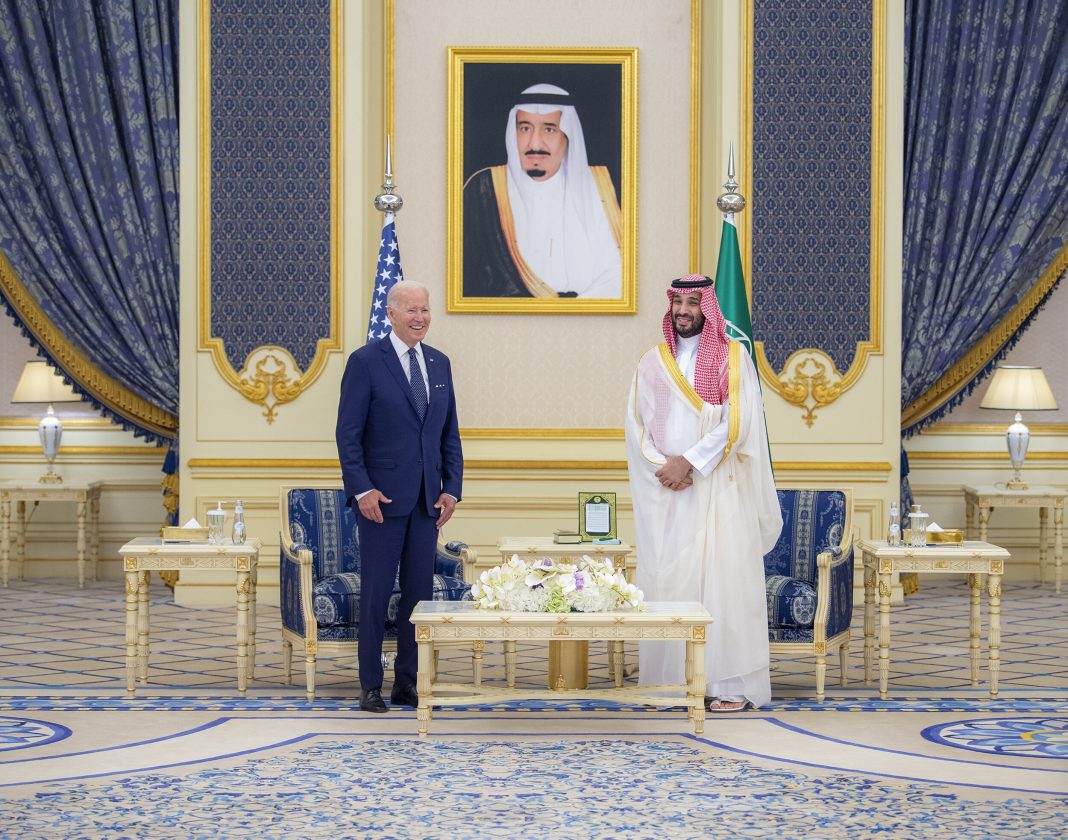President Joe Biden’s foreign policy approach towards Israel’s war on Gaza has not only caused moral outrage but also damaged his relationship with his base and swing state voters. Critics have attributed Biden’s mishandling of the conflict to incompetence or his lifelong support for Israel. However, there is a deeper geopolitical motive behind Biden’s policy that aims to advance U.S. imperial interests under the guise of diplomacy.
Biden is seeking to solidify a far-reaching security deal with Saudi Arabia, which would commit the U.S. to defend the repressive Saudi regime and potentially lead to a new cold war. This plan for peace in the Middle East is reminiscent of Donald Trump’s playbook, as Biden hopes that resolving the Gaza crisis will boost his chances in the upcoming election.
The proposed agreement with Saudi Arabia would build on the Trump administration’s Abraham Accords, which normalized relations between Israel, the United Arab Emirates, and Bahrain. However, it goes a step further by offering a security guarantee to Saudi Arabia. Despite the kingdom’s history of human rights violations and its destructive war in Yemen, Biden’s team sees a deal with Saudi Arabia as crucial to their broader Middle East strategy.
Talks for the agreement were reportedly on the verge of a breakthrough, but if it goes through, it will escalate tensions with Iran and embolden dictators like Saudi Crown Prince Mohammed bin Salman. Biden’s push for a Saudi deal is largely driven by the desire to escalate the proxy war against Iran and compete with China for power in the region.
With the election approaching, influential Democrats are hesitant to intervene, as Biden is desperate for a win in the Middle East. However, few are willing to acknowledge that the Saudi pact is simply a bad deal.
The proposed defense pact with Saudi Arabia represents a stark reversal of Biden’s previous stance on the country. During his presidential campaign, he vowed to hold Saudi Arabia accountable for its human rights violations and halt weapons sales. Now, the agreement would require sacrificing American lives and resources to protect a government known for its assassination of journalist Jamal Khashoggi and its brutal war in Yemen.
While the exact details of the agreement are not public, it is believed to involve coordinated maneuvering against Iran, China, and Russia, as well as a push for a two-state solution to the Israeli-Palestinian conflict. It would also potentially include support for a Saudi civil nuclear program and access to advanced U.S. weapons.
Normalization between Saudi Arabia and Israel is another aspect of the deal. While Saudi Arabia has indicated its willingness to normalize relations in exchange for a demilitarized Palestinian state, the main obstacle remains Israeli Prime Minister Benjamin Netanyahu, who opposes the creation of a Palestinian state and has escalated tensions with his offensive against Gaza.
The Biden administration sees an opportunity for Israeli-Saudi diplomacy even in the aftermath of the Gaza war. They are seeking to have Saudi Arabia and other Gulf countries contribute to the reconstruction of Gaza as a means to facilitate normalization. However, the potential agreement is already being hyped as a diplomatic triumph that could bring peace to the region, despite the concerns and opposition it should raise.
Even supporters of former President Trump’s Abraham Accords have reason to oppose this Saudi deal, as it goes further in sacrificing U.S. interests. Under Biden, the Saudi regime would receive a security commitment and other rewards, while Israel gains legitimacy with its neighbors. Meanwhile, the American people do not see any clear benefits in return.
In conclusion, Biden’s pursuit of a foreign policy that blindly supports Israel’s war on Gaza is driven by a deeper geopolitical motive to secure a far-reaching security deal with Saudi Arabia. This deal would have significant implications for U.S. interests in the region and potentially escalate tensions with Iran and China. The proposed agreement raises concerns about sacrificing American lives and resources to protect a repressive regime and undermines efforts for peace in the Middle East.


